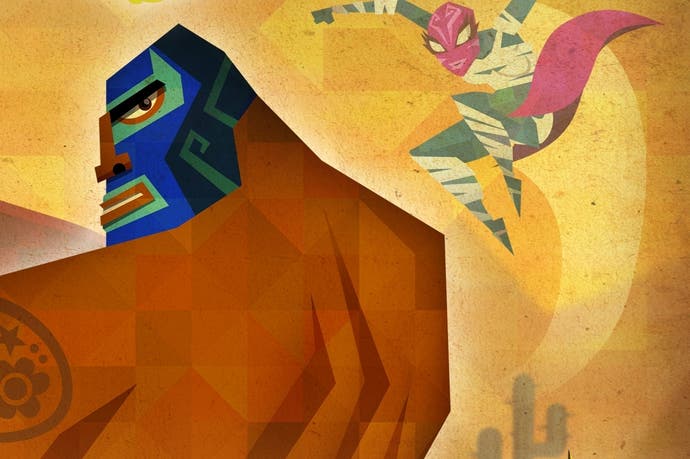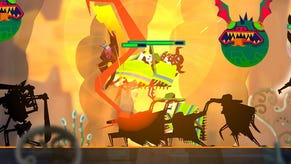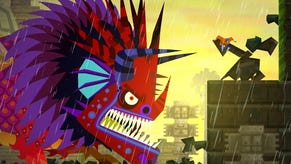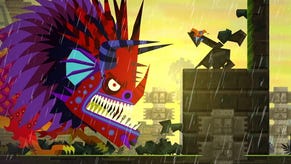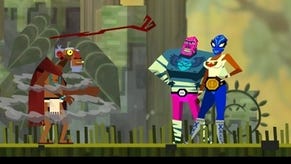Guacamelee review
Super Mariachi.
From skeletal mariachi players to side-quests concerning enchilada construction, Guacamelee is a surprisingly lovable trawl through a nation's stereotypes. It's beautiful, because the possibilities suggested by Mexican art are beautiful - particularly when indie influences like Fez and Superbrothers are thrown in on top. It's satisfying, too, because the heft and snap of Mexican wrestling makes an ideal basis for the brawler that sits at the heart of this 2D metroidvania. The greatest source of inspiration Guacamalee finds in Mexican culture isn't the luchador mask its resurrected hero draws his power from, however, or even the grinning skulls that litter its battlefields. Instead, it's the humble piñata: the colourful sacrificial bobkin of a million summer birthday parties, built of papier maché, loaded with glittering surprises, and ready to spill forth riches once its flimsy body has been caved in.
It's the piñata that gives the game its ultimate pleasures, as you use your sun-baked fists to split open the paper ghouls and monsters you're up against before snagging the coins they've been holding. It's the piñata that serves as your reward for beating a combat arena: warping into view ready to be blown to pieces with a few valedictory punches. Most of all, it's the piñata that symbolises this light-hearted confection of throwaway violence and colourful feedback. Guacamalee is an afternoon's worth of sugary memories. Fire it up, knock it around a bit, and don't be surprised when you can't remember that much about the whole business afterwards.
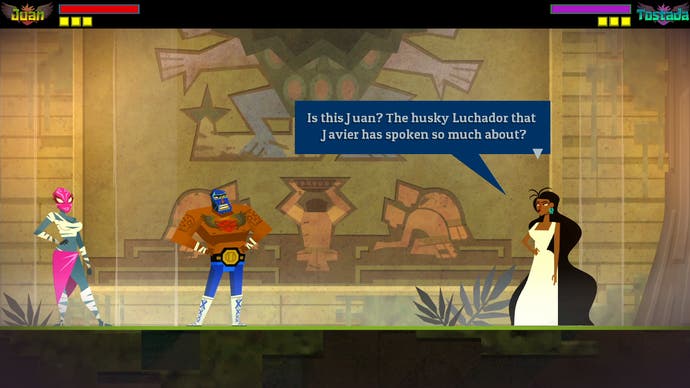
The story is suitably forgettable stuff. Juan, the hero, is a newly murdered nice guy who is raised from the dead in the form of a super-powerful luchador when the woman he loves is kidnapped by spectral banditos. From there, you're into standard genre territory, spreading out across a map in all directions as you chase down bosses, stock up on powers, and unlock new areas that range from sprawling deserts and spooky forests to dusty mines and a flying temple. It's extremely traditional throughout, but therein lie its pleasures. If you like knocking down a series of different door types as you collect various bits of things, you won't be disappointed with Guacamelee's itinerary.
Combat is the real highlight, a winningly blunt system built of dodges, throws, launchers and frenzied strikes. It starts off feeling pleasantly button-mashy, and while it never seeks to become a truly technical fighter, it still grows in rigour until you have to really think about the enemies you're up against and the peculiar challenges they pose. When it doubt, channel your inner luchador: most fights are about gaining momentum and then keeping that momentum going. Soften enemies up enough and you'll be able to grab them and chuck them around, hopefully catching a few of their friends in the process. Time it right and that will soften those friends up for a bit more chucking around too. By the end of the game, each encounter is an opportunity to turn the screen into a blizzard of arms and legs, particularly if you're playing with a co-op partner. Give even the most basic foe an opening, though, and you may find it surprisingly hard to get back on top.
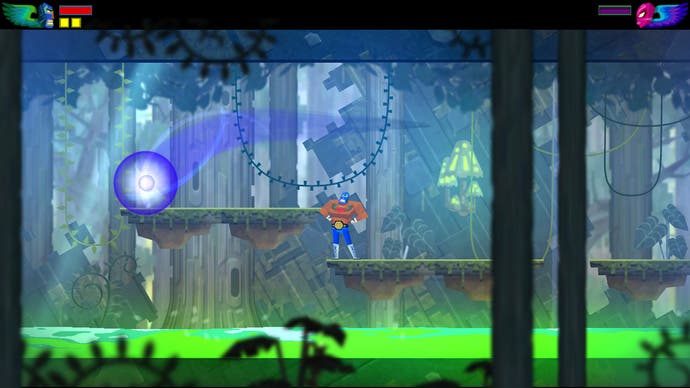
Throughout the six or seven hours of the campaign, brawling is enlivened by a decent selection of undead enemy types - including ranged, flying, super-speed and super-large variations - and a handful of surprisingly no-nonsense bosses. Crucially, the whole thing's delivered with a well-judged hit-pause, too, bringing a much-needed sense of weight to the selection of paper-thin baddies you're battling. Fights come thick and fast as Guacamelee gets into gear, and it might have quickly become tiresome. Thankfully you're always learning, particularly when enemies start to don colour-coded shields that require specific moves - or a quick flurry of blows - to shatter, and when they begin to zap between dimensions, forcing you to switch polarity to connect with them.
Both of these last elements trickle through to the exploration side of things. Early on in the narrative, Juan's given the power to shift between what amounts to two separate versions of each level: the worlds of the living and the dead. Along with a gentle tweaking of the art, these interlocked landscapes also have slightly different geometry. A pool of water in one world could be a pool of lava in another, walls may have moved, unbroken flooring might have given way to caverns. In a similar manner to Housemarque's Outland, this leads to some clever, almost rhythmic puzzles as you dash across the screen switching back and forth while you avoid obstacles, but it also results in some infuriating platforming sections as you wall-jump between warping pillars and - in the game's final sections - start to tackle the sudden appearance of magical portals, too. The game gets busier - and a lot more challenging - as it proceeds, but it doesn't always become more entertaining at the same time.
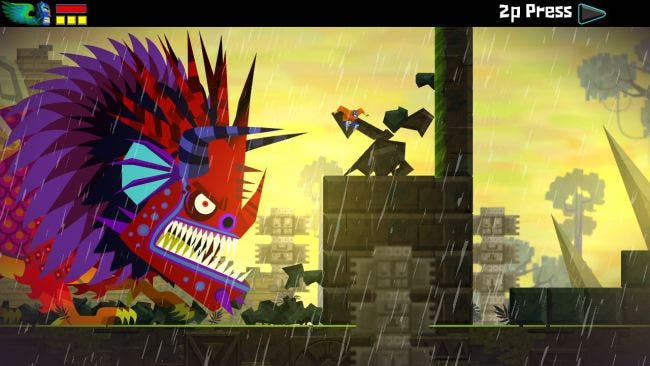
Equally, Guacamelee's unlockable colour-coded powers are a bit of a mixed blessing. On one hand, they provide a clear-headed means of gear-gating as you learn which parts of the scenery can be ground-pounded, say, and which can be headbutted to open up new paths, and there's a certain thriftiness at work in the way that combat moves all come with their own traversal gimmicks. Sadly, these special attacks aren't quite exciting enough to give you the classic metroidvania thrill that should come with new piece of kit. For the most part, you're basically getting directional blows glorified with a colourful flourish, and the final handful of unlocks - they include a wall-run and the ability to jet across the world in a mad horizontal dash - suggest that inspiration has started to dry up. (Equally, for PS3 players, the decision to map these moves to a button press and a directional push of the thumbstick can very occasionally suggest a faith in the controller that the DualShock's fabled dead zones might not always deserve. It's a minor annoyance, but it's coupled with a nasty difficulty spike or two and a fiddly double-jump.)
Still, at least you can transform into a chicken (it turns out to be Guacamelee's version of the morph-ball) in order to explore narrow gaps in the scenery and track down hidden treasures. This sort of delightful thinking ensures that even when Juan's adventure threatens to gently frustrate - when its special powers start to grow dull, when its platforming has you temporarily stumped, when a cruise through the unlock shop reveals that there's nothing, really, worth buying - you'll always come back for more. Guacamelee's world is riddled with humour, game references, and sweet touches, and while its map is fairly small, there are plenty of chests tucked away waiting to be bashed open and plenty of side-quests waiting for you back in town.
Drinkbox Studios has already made a name for itself on PSN with colourful platformers like Mutant Blobs Attack. Guacamelee suggests a real step-up in terms of ambition, and that's a welcome move - even if it does perhaps come at the cost of a little polish. Like the best luchadores in the business, Guacamelee has real heart and a blazing desire to put on a good show.
